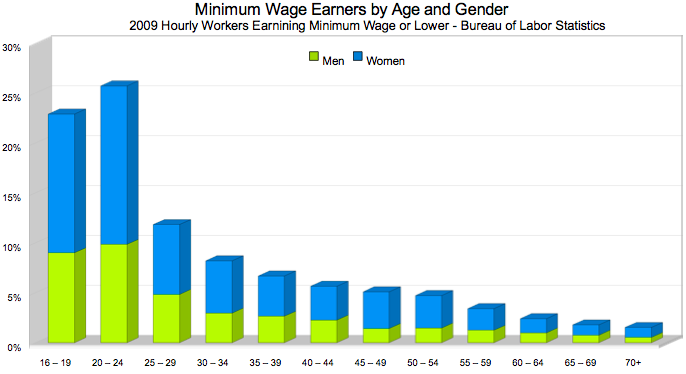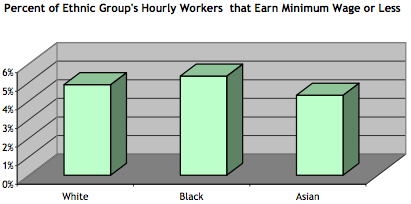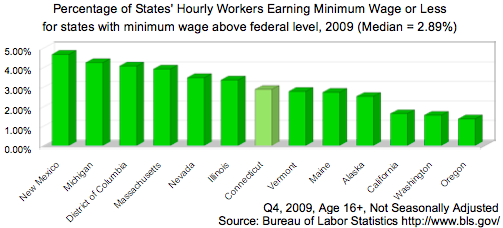A lot goes into choosing an appropriate minimum wage level. Like most questions of government intervention in markets, it comes down to efficiency and equity. But even if everybody agreed on a balance between the two, there is still no guarantee that the intentions behind the law will match reality.
In the interest of providing a resource for those concerned about the minimum wage, I’ve distilled some data from the 2009 Bureau of Labor Statistics tables to address some basic questions.
Who Earns the Minimum Wage in the United States?
- 4.9% of hourly workers earn the minimum wage or lower*
- 2.9% of all workers earn the minimum wage or lower*
*Does not include self-employed individuals
Approximately half of the workers earning minimum wage or less in the United States are less than 25 years old. These workers are more likely to move beyond minimum wage employment than those from older brackets. More women than men earn the minimum wage, both in aggregate and within individual age groups.
Among the hourly workers of different ethnic groups, there is not much difference in the portion that earns minimum wage. The range varies only about one percentage point, from 4% to 5%.
Further data on who earns minimum wage in the U.S. is available at the Bureau of Labor Statistics Web site.
Who Earns Less Than the Minimum Wage?
Some categories of workers are exempt from minimum wage laws, including some teachers, computer professionals, and administrative professionals. More information about exemptions is available from the Department of Labor.
Is the Minimum Wage a “Living Wage”?
The concept of a living wage is ambiguous practically by definition. In this post, it refers to the threshold described here. These researchers provide an editable spreadsheet, allowing you to set your own expense estimates if you are so inclined.
Using their default settings, the Massachusetts minimum wage doesn’t meet the projected expenses of an individual working 40 hours per week, 52 weeks per year. This is also true of two adults with no children, and the gap only increases when children are involved. Fortunately, many of the workers earning minimum wage are not heads of households. But for those who are, this is problematic.
Is the Massachusetts minimum wage law significant?
One could reasonably conclude that the employment level impact of a state’s minimum wage will vary directly with the number of workers currently earning it. Massachusetts is one of twelve states (plus D.C.) with a minimum wage above the federally mandated level. A high proportion of its workers earn minimum wage, relative to the rest of this group:
Based on this “high” percentage, it appears that many workers would be directly affected. If employers had the option of paying these people less now, odds are that they would in most cases. An increase in the minimum wage would create higher incomes for some, and likely unemployment for others due to employers no longer being able to earn a profit based on higher labor costs.
Of course, the demand for these employers’ products may increase due to workers having some more disposable income, but that calculation is beyond the scope of this post.
I’m curious to hear readers’ thoughts on the minimum wage issues mentioned here, as well as what other statistics they’re interested in seeing on the subject.
-Andrew



